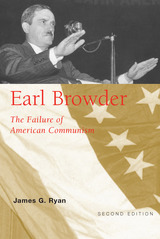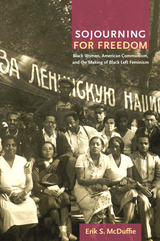
In 1943 the American Communist Party was a large, politically influential, broadly based movement. In 1957 it was a small, weak, and isolated political sect. The Party’s decline in the intervening Cold War years is the subject of this book—an analysis of a major radical movement that touched millions of Americans and pervaded many aspects of American life.
The author, at one time active in the Party and foreign editor of its paper, The Daily Worker, and now a scholar and professor of political science, has combined personal experience with careful scholarship to analyze what happened to a revolutionary organization that found itself unable to make a revolution. His approach is not autobiographical, but rather analytical.
Joseph Starobin places the Party in its historical and political context and describes its unsuccessful efforts to adapt to the demands of the American political situation. Throughout the book are fresh interpretations of important events: the struggle in 1945 between Earl Browder and William Z. Foster for leadership of the Party, the outcome of which had a profound effect on the Party’s future course; the nature of Browder’s policies and Moscow’s eventual rejection of him; the Henry Wallace movement of 1948; the right–left battle within the CIO in the late forties; the “Communist conspiracy” problem of the fifties; the Party’s relationship with the Soviet Communists; the origins of the “Black liberation movement.”
The author’s basic conclusion is that American Communists were on their way to becoming an authentic and powerful radical movement in American life but were defeated by a basic contradiction: they could not continue to be part of a world movement dominated by Leninist concepts and yet consolidate their relative success within the United States, where these concepts were not applicable. To survive, the Party had to change. It had to anticipate by fifteen years and to endure the two tendencies that would develop within world Communism: the Russian quasi-revolutionary strain and the Chinese ultra-revolutionary. It tried, Mr. Starobin shows, and it failed.
American Communism in Crisis, 1943–1957 will interest not only history-minded readers but also anyone concerned today with social change. The book has much to say to the new left—giving historical material necessary for an understanding of its past and its potential.

Earl Browder, the preeminent 20th-century Communist party leader in the United States, steered the CPUSA through the critical years of the Great Depression and World War II. A Kansas native and veteran of numerous radical movements, he was peculiarly fitted by circumstance and temperament to head the cause during its heyday.
Serving as a bridge between American Communism’s secret and public worlds, Browder did more than anyone to attempt to explain the Soviet Union’s shifting policies to the American people in a way that would serve the interests of the CPUSA. A proud and loyal follower of Joseph Stalin, Browder nevertheless sought to move the party into the U.S. political mainstream. He used his knowledge of domestic politics to persuade the Communist International to modify Popular Front (1935-1939) tactics for the United States.
Despite his rise in the hierarchy, he possessed an independent streak that ultimately proved his undoing. Imprisonment as he neared age 50 left permanent psychological damage. After being released with the approval of President Franklin D. Roosevelt, Browder lost his perspective and began entertaining delusions of grandeur about his status in American politics and in the world Communist movement. Still, he could never quite bring legitimacy to the CPUSA because he lacked the vision and moral courage to separate himself totally from the Soviet Union. Ryan concludes that Browder was not so much insincere as deluded. His failure contributed to the demise of the popularity of the Communist party in the United States.
In preparation for this book, the author consulted the Browder Papers at Syracuse University and U.S. Government documents, particularly the F.B.I. files. In addition, he traveled to Russia for research in the Soviet Archives when recently opened to Western scholars, including the records of the former Communist International and a collection of American Communist party files, 1919-1944, shipped secretly to Moscow long ago. Indeed, until 1992, the existence of the CPUSA collection was only rumored.


READERS
Browse our collection.
PUBLISHERS
See BiblioVault's publisher services.
STUDENT SERVICES
Files for college accessibility offices.
UChicago Accessibility Resources
home | accessibility | search | about | contact us
BiblioVault ® 2001 - 2025
The University of Chicago Press









